Happy Friday! It’s safe to say it’s been a busy month in Washington. As we seek to cover the turbulent early days of the new administration, we encourage you to check out Dispatch Premium.
Premium members unlock our best perks—uninterrupted access to our reporting and podcasts, deeper reporting and analysis, and exclusive ways to engage with our team of reporters and editors. Dispatch Premium includes three annual memberships, ad-free reading and listening, VIP access to events, and more.
You can click here to join!
Quick Hits: Today’s Top Stories
- The Israel Defense Forces (IDF) confirmed Friday morning that the group of murdered hostages Hamas handed over earlier this week included Oded Lifshitz and brothers Ariel and Kfir Bibas. However, forensic scientists were not able to identify a fourth body, which Hamas had claimed was Shiri Bibas, the children’s mother. The IDF described the revelation as a “very serious violation” of the U.S.-brokered ceasefire agreement between Israel and the Palestinian terrorist organization. Israeli authorities also concluded that Ariel and Kfir—just 4 years old and 9 months old at the time of their abduction from their Nir Oz home—were “brutally murdered” by terrorists in November 2023, not killed in an Israeli airstrike as Hamas claimed.
- Israel halted public transportation nationwide on Thursday after three buses across the Tel Aviv area exploded in a suspected terrorist attack. No injuries were reported as a result of the bombs, which detonated in empty vehicles. Police later recovered two unexploded devices on buses nearby. Responding to the apparent coordinated attacks on Thursday, Israeli Prime Minister Benjamin Netanyahu directed the IDF to carry out a “massive operation” in the West Bank, where Israeli troops have in recent weeks been conducting frequent raids against terrorist cells.
- The Department of Homeland Security on Thursday revoked Temporary Protected Status for Haitians living in the U.S., putting an estimated 520,000 immigrants—many of whom fled rampant gang violence in their home country—at risk of deportation in August. The move reversed the Biden administration’s effort last year to extend the protections until February 2026. In a statement announcing the change, a DHS spokeswoman said the status had been “abused and exploited” by illegal immigrants for decades. The administration is “returning TPS to its original status: temporary,” she added.
- A federal judge determined on Thursday that the Trump administration had not fully complied with his court order pausing a 90-day freeze on the disbursement of foreign aid. In the ruling, U.S. District Judge Amir Ali directed the State Department and Office of Management and Budget to “immediately cease” its continuation of the blanket suspension of foreign assistance but stopped short of holding Trump officials in contempt for violating the temporary restraining order.
- A federal judge on Thursday denied an effort by five labor unions to block the Trump administration from ordering mass firings across the federal government. In the ruling, U.S. District Judge Christopher R. Cooper, who was appointed by former President Barack Obama, indicated that while he sympathized with the unions’ argument, the court “likely lack[ed] the subject matter jurisdiction” to halt the executive order calling for “large-scale reductions” in the federal workforce. The judge said the case should be taken to the Federal Labor Relations Authority, which handles federal labor disputes.
- The Senate voted 51-49 on Thursday to confirm Kash Patel as director of the Federal Bureau of Investigation, with Republican Sens. Susan Collins and Lisa Murkowski joining Democrats to oppose his bid. A Trump loyalist, Patel will lead the FBI amid the administration’s efforts to purge the federal agency. His nomination raised concerns among Democratic lawmakers, who argued Patel’s past embrace of “deep state” conspiracy theories could lead him to wield his authority as FBI director—a position theoretically shielded from political considerations—to seek retribution against Trump’s perceived rivals.
- Sen. Mitch McConnell of Kentucky—the upper chamber’s longest-serving party leader in history—announced on Thursday that he won’t seek reelection next year, capping off a 40-year career in Congress. McConnell, 83, stepped down from his leadership position last year and has recently suffered several health challenges. His announcement set off early Republican jockeying for the seat in solidly red Kentucky; Rep. Andy Barr, former state Attorney General Daniel Cameron, and businessman Nate Morris have all signaled their interest in a Senate run.
The City (Hall) That Never Sleeps
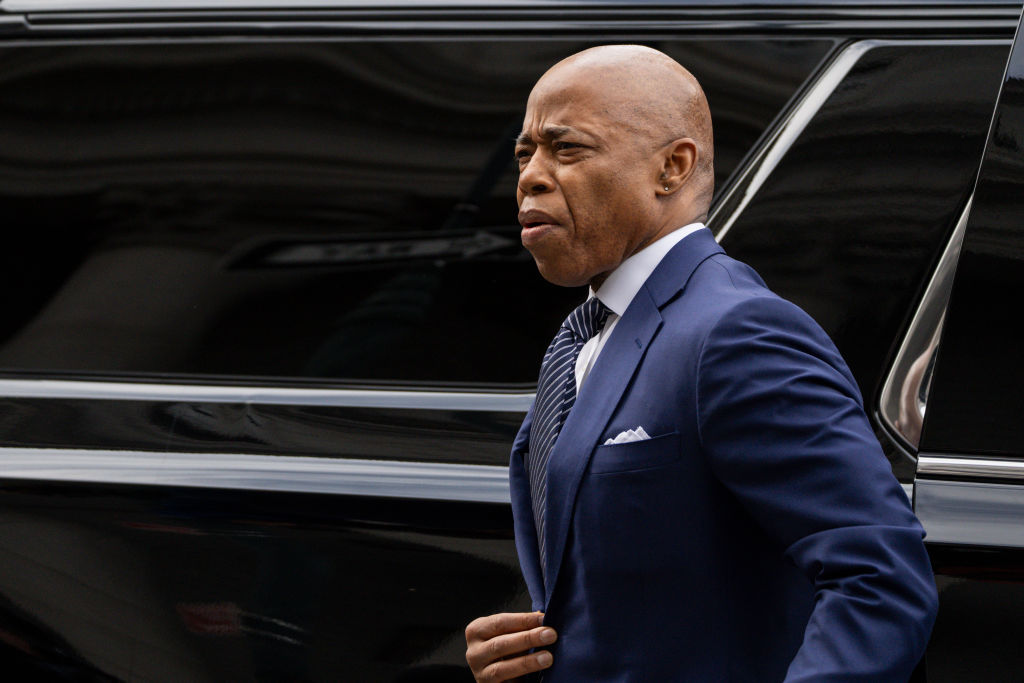
Speaking before Maranatha Baptist Church in Queens on Sunday, embattled New York City Mayor Eric Adams likened himself to the biblical figure of Lazarus, whom Jesus brought back from the dead in the Gospel of John. “I’ve got a mission to finish,” he said. “I am going nowhere.”
But while Adams has (somewhat miraculously) survived his fair share of corruption scandals and legal challenges, we’d hardly consider President Donald Trump a messianic figure.
Last week, acting U.S. Deputy Attorney General Emil Bove ordered prosecutors to drop federal corruption charges against the Democratic mayor—a move that plunged New York City Hall into chaos and set off a nearly unprecedented power struggle at the Department of Justice. And he appears determined to plow ahead despite bipartisan opposition to the order, which would allow Adams to effectively sidestep charges of conspiracy, wire fraud, and soliciting and accepting a bribe.
Bove has repeatedly said that the federal judge overseeing the case, Dale C. Ho, has little power to stop the Justice Department from dropping the case, while New York Governor Kathy Hochul has signaled that she’s currently unwilling to use her authority to remove Adams. And although state and local authorities may step in to continue the corruption investigation, experts warn that the DOJ’s push to drop the high-profile case—which detractors said amounted to quid pro quo—could have far-reaching repercussions for the rule of law.
Adams, who once declared himself “the future of the Democratic Party,” took office in 2021. And it’s been a bumpy ride ever since. The mayor and his administration are now facing a series of corruption scandals dating back years. Several members of his administration have already resigned as the result of the allegations—which range from running straw donor rings to selling access to city contracts and extorting money from restaurant owners facing noise complaints—and because of the alleged quid pro quo.
But the federal corruption case against Adams lies at the center of the storm facing City Hall: Investigators allege that he has accepted more than $100,000 in benefits from the Turkish government, including international flights and stays at luxury hotels, in exchange for pressuring the New York City Fire Department to skip a building inspection at the new Turkish consulate in Manhattan. Adams’ staffers also allegedly created fake receipts for the flights gifted to Adams, telling Turkish Airlines staff to bill “somewhat real” amounts in an effort to cover his tracks.
Prosecutors indicted Adams in September, and initially, his defense looked shaky at best. When the mayor met with President Donald Trump at Mar-a-Lago and attended the inauguration in January, most observers assumed it was a fairly transparent attempt to secure a presidential pardon. But on February 10, Bove directed federal prosecutors in the Southern District of New York to request a dismissal of the case.
“It cannot be ignored that Mayor Adams criticized the prior Administration’s immigration policies before the charges were filed,” Bove wrote in a memo alleging that the mayor’s past criticism of Joe Biden’s border policy had motivated attorneys to open an investigation. Bove also argued that the probe disrupted Adams’ ability to carry out his mayoral duties: “The pending prosecution has unduly restricted Mayor Adams’ ability to devote full attention and resources to the illegal immigration and violent crime that escalated under the policies of the prior administration.”
The decision came as a shock to outside observers—but it surprised many in the Justice Department, as well. On February 12, Danielle Sassoon—the Trump-appointed acting U.S. attorney for the Southern District of New York—emailed a letter to Attorney General Pam Bondi, writing that she could not “in good faith” ask a judge to dismiss the case on the grounds that Bove outlined. Even though Bove “disclaimed any intention to exchange leniency in this case for Adams’s assistance in enforcing federal law,” she declared, “that is the nature of the bargain laid bare in Mr. Bove’s memo.”
Sassoon also claimed that Adams’ legal team attempted to offer cooperation with the Trump administration in exchange for dropping the case. “Adams’s attorneys repeatedly urged what amounted to a quid pro quo,” by indicating that Adams would only be able to enforce immigration law if he was not facing an investigation, she wrote. Sassoon also recounted that Bove “admonished” a DOJ employee for taking notes at the meeting and demanded that they be handed over. “I remain baffled by the rushed and superficial process by which this decision was reached, in seeming collaboration with Adam’s counsel and without my direct input,” Sassoon concluded. She then resigned the day after.
In a letter accepting her resignation, Bove accused Sassoon of having “lost sight” of her oath and promised to open internal investigations into her conduct. He then transferred the case from the Southern District of New York to the DOJ’s Public Integrity Section in Washington in an attempt to find a prosecutor who would sign the order. But there, five additional attorneys stepped down in protest of the order. A veteran lawyer finally signed a motion to dismiss the charges last week in a reported effort to protect the career of younger attorneys.
But one more resignation letter was coming: that of Hagan Scotten, an assistant U.S. attorney for the Southern District of New York who had worked under Sassoon on the Adams case. “Our laws and traditions do not allow using the prosecutorial power to influence other citizens, much less elected officials, in this way,” he wrote in a letter that, like Sassoon’s, was made public. “If no lawyer within earshot of the President is willing to give him that advice, then I expect that you will eventually find someone who is enough of a fool, or enough of a coward, to file your motion. But it was never going to be me.”
The decision leaves the DOJ in somewhat uncharted territory. Bennett Gershman, a law professor at Pace University and an expert in prosecutorial misconduct and corruption, said that there’s little precedent for the federal government to suddenly drop such a high-profile case. “I can’t think of a case anywhere even close to this,” he told TMD.
The DOJ’s reasons for requesting the dismissal have also changed. Bove’s initial memo stated that he was not considering the legal merits of the case, but wanted it dropped for reasons of policy. But during an interview at the Conservative Political Action Conference on Thursday, Attorney General Pam Bondi told Sen. Ted Cruz that the case against Adams was “incredibly weak” and politically motivated, echoing arguments made by her chief of staff on X the day before.
The shifting justifications indicate problematic legal reasoning, David Lat, a lawyer, journalist, and former assistant U.S. attorney, told TMD. “It is a good thing for the government to dismiss cases that it believes are factually or legally weak,” he said. “But to say you’re dismissing for reason X, and then to change and say you’re dismissing for reason Y, that sets off alarm bells for a lot of people.” When asked whether the DOJ’s case was, in fact, abnormally weak, Gershman was blunter than Lat: “That’s baloney.”
But both experts agreed that while what the DOJ is doing may be unwise, it is within the administration’s authority to drop a case. The two people most positioned to intervene–Judge Ho and Gov. Hochul–appear to agree. While the judge overseeing a federal trial is technically able to deny the prosecution’s request to dismiss the case, it’s unclear how Ho could enforce such a decision. Some outside observers have called for the judge to reject the request and appoint an independent prosecutor. But with a Supreme Court that, according to Lat, is sympathetic to a strong view of executive power, the successful creation of an independent official within the executive branch by the judiciary would be an unlikely proposition. “I will tell you that under this Supreme Court, that will not fly,” said Lat.
During a hearing on Wednesday, Ho seemed to be leaning toward that assessment. When questioning Bove, who was representing the DOJ in court by himself, the judge noted that the request for dismissal represented a “complicated situation” but gave no obvious sign that he was leaning toward granting Bove’s request. He did, however, closely question Bove and Adams, asking the mayor repeatedly if he felt pressure in any way by the DOJ. Adams, under oath, repeatedly said no. At the end of the hearing, Ho said that he would not rule from the bench, but would issue a written ruling in the near future. At the time of publication, the ruling is still pending.
Ho, however, could still make one significant intervention, even while granting the request for dismissal: rejecting Bove’s request to dismiss the case “without prejudice,” and opting for a dismissal “with prejudice.” In this scenario, federal prosecutors would be unable to re-open the case against Adams, removing the threat of prosecution as a potential weapon in the DOJ’s arsenal going forward.
The other major potential player in Adams’ case, Hochul, technically has the ability to remove any mayor in New York due to a Progressive-era state constitutional amendment. But such a power is very rarely exercised—it has never been fully enacted against a mayor of New York City and Hochul appears reluctant to become the first to do so. On Thursday, she announced that would not initiate the removal process against Adams. “I cannot deny the people of this great city the power to make this decision for themselves,” Hochul said.
With a June Democratic primary and a November general election for the mayorship within sight, Hochul is likely hoping that New York voters remove Adams themselves, sparing her from taking a difficult step. But she did propose a package of reforms to increase oversight over the mayor, including the creation of a special investigator general for New York City affairs in the state government.
But in the coming months, there’s one more New York politician who has the potential to threaten Adams’ position: District Attorney Alvin Bragg. Bragg, who has already indicted a top Adams aide, could step in to charge Adams under New York state law. “If these charges get dismissed federally, I feel pretty darn confident that Bragg will take them over,” Gershman told TMD.
Finally, Adams could simply be pushed out by internal pressure. On Monday, four deputy mayors—officials tasked with heading administration efforts in sectors like public safety and health and human services—announced that they would resign. “Due to the extraordinary events of the last few weeks and to stay faithful to the oaths we swore to New Yorkers and our families, we have come to the difficult decision to step down from our roles,” Deputy Mayors Maria Torres-Springer, Anne Williams-Isom, and Meera Joshi wrote in a joint statement. Chauncey Parker, another deputy mayor, also announced his departure later that day.
Following a round of resignations by top Adams officials in October set off by his initial indictment, it appears quite possible that his administration could continue to bleed personnel. Adams, however, has projected confidence throughout the saga, vowing to “never surrender.”
But whatever Adams’ eventual fate, the consequences for the legal profession are likely already being felt. “ There will be a lot of lawyers, including conservative lawyers, who will think long and hard before joining this administration, and some of them will decide not to,” Lat told TMD.
Worth Your Time
- Writing for Persuasion, Francis Fukuyama argued that Donald Trump’s betrayal of Ukraine is a betrayal of the U.S.-led liberal world order. “We are in the midst of a global fight between Western liberal democracy and authoritarian government, and in this fight, the United States has just switched sides and signed up with the authoritarian camp,” he wrote. “The United States since 1945 has supported a liberal world order built around norms like not using military force to change borders, and formal agreements for mutual defense like NATO and the security treaties with Japan and South Korea. This system has been spectacularly successful at promoting peace, prosperity, and democracy. The United States has used its soft power through instruments like the National Endowment for Democracy to support like-minded democracy proponents to resist authoritarian power from countries like China, Russia, Iran, and North Korea. The United States under Donald Trump is not retreating into isolationism. It is actively joining the authoritarian camp, supporting right-wing authoritarians around the world from Vladimir Putin to Viktor Orbán to Nayib Bukele to Narendra Modi.”
Presented Without Comment
New York Times: U.S. Objects to Calling Russia ‘Aggressor’ in G7 Statement on Invasion
Also Presented Without Comment
The Hill: Former ‘Squad’ Members Launching ‘Bowman and Bush’ YouTube Show
In the Zeitgeist
The Screen Actors Guild is hosting its annual award show early next week, and while there are many strong contenders for best female actor in a leading role, we have a hunch it might be Demi Moore’s year after her chilling performance in The Substance.
Toeing the Company Line
- In the newsletters: Nick Catoggio considered how Twitter is becoming real life in the form of the U.S. government.
- On the podcasts: On The Dispatch Podcast roundtable, Sarah Isgur, Jonah Goldberg, Mike Warren, and Steve Hayes discuss DOGE, entitlement reform, and more.
- On the site: Mike Warren unpacks Donald Trump’s Ukraine fixation, Kevin Williamson pushes back against a National Review editorial in defense of DOGE, and Mara Rudman makes the case for reforming, not gutting, USAID.
Let Us Know
Do you think Gov. Kathy Hochul will eventually remove Mayor Eric Adams?




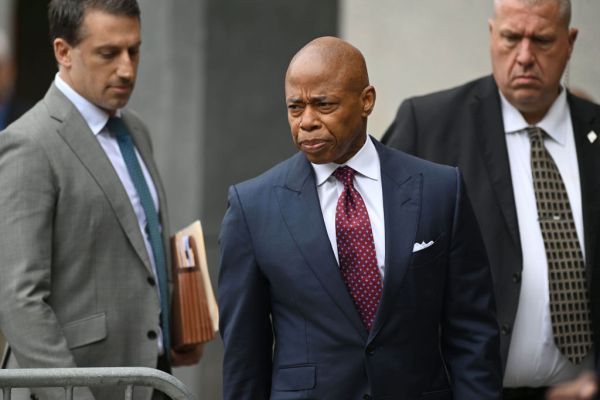
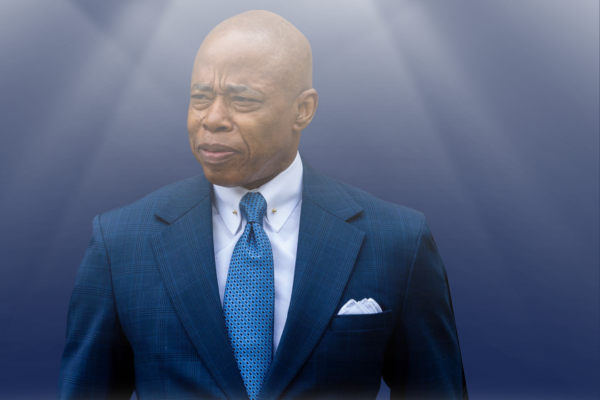
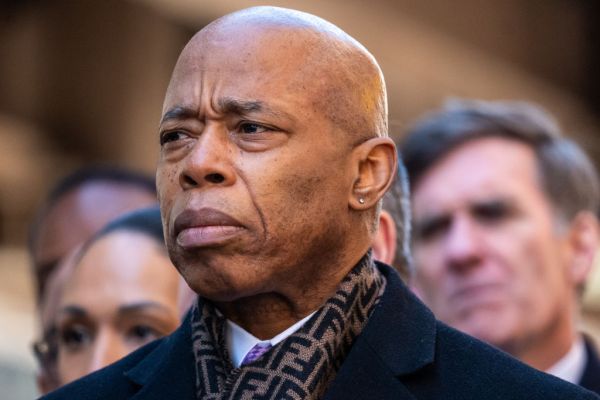

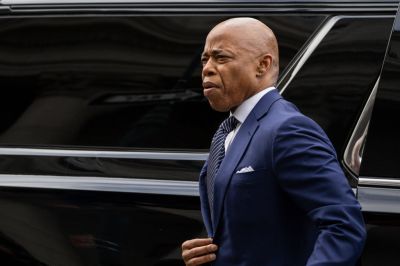
Please note that we at The Dispatch hold ourselves, our work, and our commenters to a higher standard than other places on the internet. We welcome comments that foster genuine debate or discussion—including comments critical of us or our work—but responses that include ad hominem attacks on fellow Dispatch members or are intended to stoke fear and anger may be moderated.
With your membership, you only have the ability to comment on The Morning Dispatch articles. Consider upgrading to join the conversation everywhere.